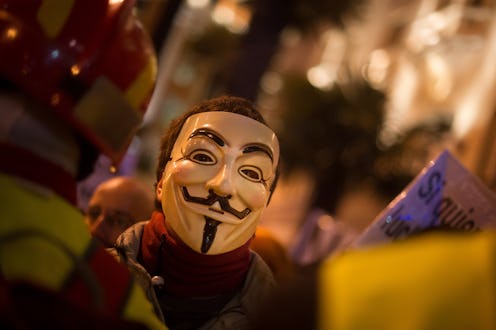News
When Anonymous Gets Things Wrong
Well, here's something you can mark down as a major flub by Anonymous. In the days following the Saturday shooting of 18-year-old Michael Brown by a police officer in Ferguson, Missouri, the hacker group plunged itself into the middle of the city's impassioned protests, and its police force's militarized response. According to The New York Times, Anonymous crashed the city of Ferguson's Web servers, revealed personal information about its chief of police, and exposed the identity of the then-unidentified shooter Thursday. Except, it didn't — Anonymous named the wrong man as Brown's shooter, a fact laid bare Friday as the Ferguson Police Department finally revealed the real name.
It was officer Darren Wilson, reportedly a six-year veteran of the Ferguson Police Department, who shot and killed Brown. But when Anonymous attempted the big reveal on Thursday, it named somebody entirely different — reportedly a police dispatcher, but not an officer himself. According to USA Today, his stepmother was panic-stricken and incensed when she heard he'd been named, and was none too pleased with the fruits of Anonymous' "Operation Ferguson" labor. As she told USA Today:
Wow, this is not good. I guess I'm going to have to sleep with my gun and put cameras on the house. Now I have to defend myself and I didn't do anything wrong ... Anonymous has really gotten out of hand.
It's a very tricky and sensitive business, frankly, to try to reason whether Anonymous' hacking attempts are right or wrong. And even beyond right and wrong, whether they're effective or ineffective as a means of pursuing justice. Broadly, American society is geared against vigilantism, at least in some part due to the fact that an innocent person could be wrongly implicated by the public — and that's precisely what we saw happen in Ferguson.
Of course, both the positive and negative outcomes of this kind of hacking ought to be considered. Here are a few examples of some other times Anonymous waded into a highly controversial event — which, as it turns out, can bring very mixed results.
The Steubenville Rape Case (2012)
Remember Steubenville? You should, if you don't: The high-profile rape case seized national attention in late 2012, and the two accused Steubenville High School football players, Ma'lik Richmond and Trent Mays, were found guilty of raping an unconscious teenage girl in March 2013.
But one key reason the case blew up to the level it did — and make no mistake, public pressure can have an impact — was because it jumpstarted a broader, and necessary conversation about rape culture. To that end, a video leaked by Anonymous offshoot KnightSec, showing a former Steubenville baseball player joking about the victim in grossly inhuman terms, loomed very large.
While it's impossible to judge the impact the footage had on the Steubenville trial's outcome (the pair were juveniles, and got light sentences at just one and two years minimum), the sight of an otherwise normal, jocular high schooler riffing about about such an awful crime furthered the conversation on rape culture in a big way.
Occupy Wall Street Pepper Spraying Incident (2011)
A year earlier, Anonymous got involved in another troubling case, and responded to it just like it responded to the Ferguson shooting: It leaked the identity of an NYPD officer who pepper-sprayed a group of Occupy Wall Street protesters.
The key difference, if it matters at all in your moral calculus, is that Anonymous tabbed the right person that time. In terms of efficacy, however, the move didn't much matter, as the Manhattan District Attorney's office ultimately declined to press charges against the officer.
The Amanda Todd Suicide (2011)
And yet, Anonymous has made more mistakes outside of Ferguson, despite whatever good it might have done in cases like Steubenville. And, as in Ferguson, being wrong can mean putting an innocent person on blast for a particularly heinous deed. Such was the case when Anonymous publicly alleged that a 32-year-old man in British Columbia had harassed and tormented 15-year-old Canadian teen Amanda Todd to the point of suicide, only to subsequently turn around and later accuse somebody else.
The consequences for the wrongly identified man were severe — the man would later tell the media that he received a deluge of death threats thanks to the claim, 50 through email, and thousands over Facebook, according to the Ottawa Citizen.
Images: Getty Images (3)
